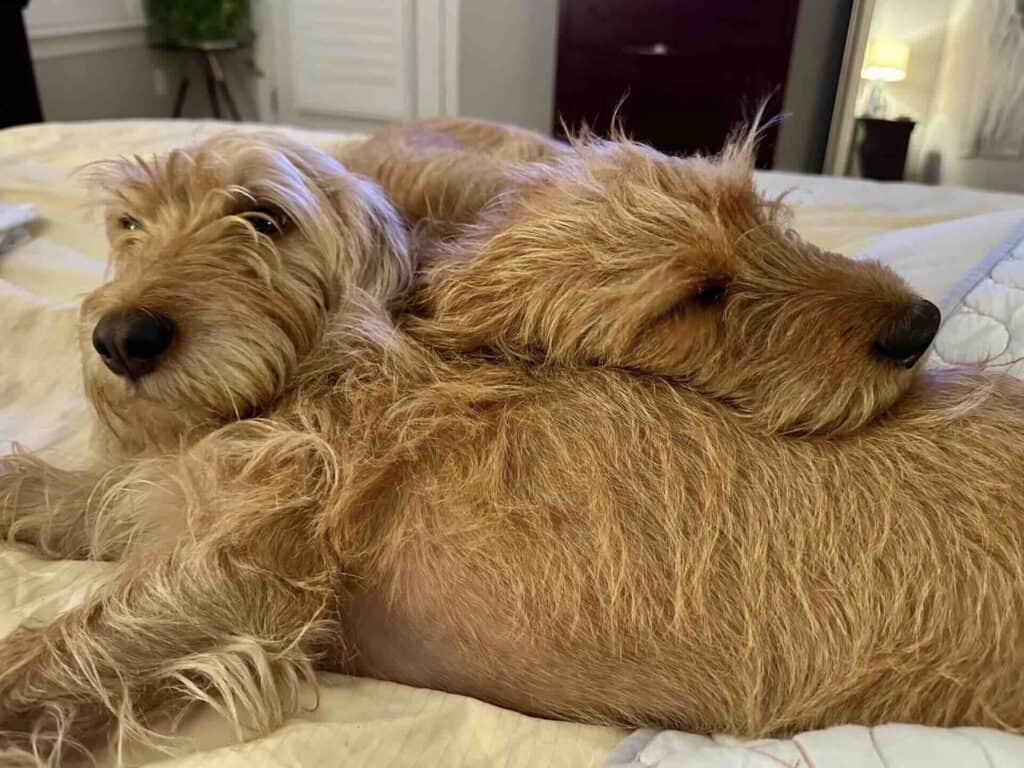About Fauves
Here are some of the most common questions we get about Basset Fauve de Bretagnes.

Frequently asked questions
If you have a question that isn't answered here, please contact us.
Contact usWhat grooming is required for a Fauve?
Some Basset Fauve de Bretagnes have more coat than others. Both are correct if the coat is coarse. Combing weekly with a fine tooth comb followed by brushing with a boar bristle brush and frequent nail trims are all most dogs need. Longer dead coat can be plucked or stripped twice a year.
Do Fauves shed?
Some shedding occurs, but if groomed regularly, it is minimal.
Do they have an odor?
Typically, Basset Fauve de Bretagnes have little or no odor. When they find a skunk in the brier patch, or they roll around in horse manure, Basset Fauve de Bretagnes require bathing.
Do Fauves have health problems?
Basset Fauve de Bretagnes are very healthy little dogs. In Europe and in the US, few problems have been reported, such as minor skin allergies, cardiac issues, epilepsy, hypothyroidism, limp tail syndrome (a temporary sporting dog syndrome), and glaucoma. In the US, health problems are rare, with the genetic marker for glaucoma having been identified and seasonal allergies being the most worrisome. With good care and nutrition, Basset Fauve de Bretagnes can live to be 16 years old or older.
How much exercise do they need?
Basset Fauve de Bretagnes minimally require a good brisk walk twice daily. They are not content to be banished to a fenced yard, as they are very social and intelligent. They much prefer to be a member of the family pack and with some exercise, they are willing to snuggle for hours.
Are Fauves noisy?
Typically, Basset Fauve de Bretagnes are not nuisance barkers and bay a wonderful ahroooo when excited. They will alert you to company at the door and are ready to give voice when a rabbit is spotted.
Are Fauves easily trained?
Basset Fauve de Bretagnes are very intelligent! They excel in performance events such as nose work, obedience, agility, tracking, search and rescue, and weight pull as long as they believe it is their idea. They have soft temperaments, and being hounds, can be single-minded. Fauves respond best to positive reinforcement.
Should I spay or neuter my dog?
If you don’t plan to breed your dog, consider spaying or neutering. Neutering eliminates heat cycles, hormone-driven mounting behavior, wandering, unwanted puppies, testicular infections, cancer, and the continuation of genetic medical conditions. Mammary Gland Cancer seldom develops in dogs spayed before their first full heat cycle. Spaying and neutering will not cause obesity, which is caused by excessive calorie intake. Weight can be controlled by proper feeding and exercise. And neutering does not change a dog’s personality, intelligence, or temperament.
Grooming a Fauve
Here are some videos we created on how to groom your Fauve.
Grooming the Basset Fauve de Bretagne
Here is a long video we made about grooming your Fauve.
Time: 41:05
Grooming the Basset Fauve de Bretagne
Here is a shorter video we made about grooming your Fauve.
Time: 6:49
Ask Nosey
Questions from our Newsletter
Nosey is a retired Grand Champion and accomplished scent work hound. She answers your questions with the assistance of experts in the field.
Are there two kinds of Basset Fauve de Bretagnes because I see some that have long bodies with very short legs and some that are almost square with very long legs? – Paul T., GA
No, Paul. There is only one kind of Basset Fauve with a written AKC standard describing the perfect specimen of the breed. It states they should be between 12.5 and 15,5 “ when measured at the withers (top of the shoulder). Fauves should only be slightly longer than tall at a ratio of 1:1.2 and are the shortest backed of all the basset breeds. You can read the entire breed standard on the AKC website HERE.
I hear breeders talking about testing for POAG. What is it and how and why do they test for it? – Becky H. MI
Becky, POAG stands for Progressive Open Angle Glaucoma. It is a genetic mutation which causes increased eye pressure by preventing the normal release of fluids in the eyes. The disease is inherited, very painful, expensive to treat and eventually leads to blindness and eye removal. Onset usually occurs around five years of age. The easiest way to diagnose the presence of the disease is a simple cheek swab for DNA that is sent to a lab who tests for the genetic marker. Two examples are Optimal Selection and Embark. All Fauves that are imported should be tested prior to breeding to ensure the disease is not being produced.